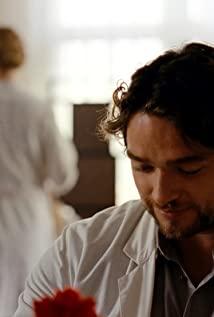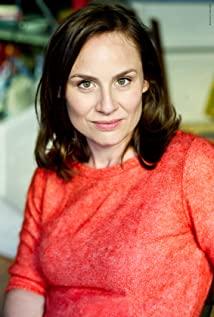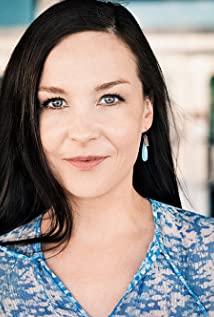"Johnny!"
Nelly yelled, turned around and ran out of the "phoenix" club. She wanted to be reunited with her husband, but she was afraid that her husband would not recognize her. In the concentration camp, Nelly's face was tortured to a comminuted fracture. After World War II, with the help of her friend Lena who was also Jewish, she returned to Berlin fortunately and successfully underwent cosmetic surgery. Just comparing the photos in the past, she is now completely different.
Those who have a little knowledge of German films in recent years should not be unfamiliar with the actors who play Nelly and Johnny. Nina Hors and Ronald Zellfeld have performed wonderfully in "Barbara", and the director of the two films is also the same person-Christian Petzold.
In the late 1990s, the "Berlin School" was born in Germany. The creative interest of these directors directly refers to the historical issues and social reality in Germany. Newcomers and new works have appeared in large numbers, and they are well-known both at home and abroad as a model of contemporary German "author films". The "Ah Boy" I saw a few years ago (see "Ah! Boy": A Day in Wen Qing Nick for the film review ) was written by a member of the school, Jan Ole Gerst. And Christian Petzold is the leader of the Berlin School, and is even known as "the best director in Germany today" and "a landmark figure in German film aesthetics and art." This shows that under the background that the box office of German authors’ films often exceeds 100,000 Euros, the intrinsic value and significance of the Berlin school directors represented by Petzold and their realist works are self-evident.
There are four famous works by Petzold. The 2007 "Yela" and the 2008 "Jerishau" successively described the groups in eastern Germany that were damaged by the "unification" after the reunification of Germany and borrowed them. The tragedy of survival reveals the other side of "German Unification" in history textbooks and politicians' credit books; 12 years of "Barbara" (I read it many years ago, it is worth reviewing, I will write a film review when I have time) In the 1980s, East Germany, unlike the once famous "Eavesdropping", added another rational perspective beyond the deconstruction era from the Western perspective; while "The Dead Bird", which was released in 14 years, changed the time. Returning to Germany in 1945, while still following Petzold's usual style, avoiding grand narratives, analyzing history and human nature with the taste of small people's life.
In the past ten or twenty years, European reflections on World War II have entered a stage of extensive reckoning of the "secondary crimes" in which countries assisted the abuse during the war. Among them, "betrayal and betrayal" is an important category of reflection. This is especially true for the German nation, who is diligent in thinking about social and humanistic care, and "The Phoenix" is also a product of this context. Nelly's longing husband Johnny is actually a shameless betrayer. Under the terror and pressure of the Nazis, Johnny betrayed his Jewish wife and went through the divorce procedures secretly. After the war, when he saw Nelly who was similar in figure and body but had a different face, he tried to make her impersonate his wife and staged a "Nelly Return" scam to receive the huge amount inherited by her dead wife. heritage.
The film advances as Nelly's dream of re-realizing from the mirror breaks up gradually. For shameful purposes, Johnny used a $20,000 reward as bait to persuade Nelly to "cooperate" and "package" her in all aspects, such as letting her imitate his wife's handwriting and try on his wife's clothes and shoes. . In order to stay with her husband at first, Nelly promised to cooperate with this scam. She was full of hope that when her husband saw that she learned the handwriting so quickly and that the shoes fit so well, she would realize that the woman in front of her was the "deceased wife", and she refused even after her friend Lena told her husband to betray her. Believe it, but also do everything possible to find excuses for my husband's behavior to comfort me. It wasn't until Lena committed suicide that Nellie saw evidence in her suicide note that Johnny had already gone through the divorce proceedings.
If the appearance of the film-Johnny first betrayed his wife and then concocted scams in order to get money for injustice-is the degradation of human nature and morality, then the deep allusion is the political shamelessness of German society after the end of World War II in 1945. When Nelly (Jew) escaped from the concentration camp and faced Johnny (Germany), a concrete and metaphysical criminal, the other party was only interested in "Nelly of the past", and only wanted to occupy her inheritance and use it. She came to start a new life and refused all opportunities to meet her. In fact, the occupation of the property of the persecuted Jews is still a public case that Germany should repent and reflect on. There is an impressive passage in the film. Nelly reminded Johnny, would our friends ask me what I experienced in the concentration camp? Johnny replied categorically: "No, no one is interested in that!" It can be seen that this political fable is a condemnation of the Germans' double betrayal during and after the war. It is also the director's "tolerance and tolerance" towards Germany and Europe. The words "forgive" were completely rejected.
The exquisite and restrained shots, ingenious and logical plots have always been the embodiment of Petzold's narrative skills. The former is incisively and vividly performed in this film, but I personally feel that it is slightly flawed in the latter. One is the role of Lena, whose original intention should be to contrast Nelly's unconsciousness. As a staff member in the Jewish office, Lena has witnessed a large number of deaths, losses and betrayals, and has no longer nostalgic for Germany. The place still belongs to Palestine) to start a new life. But Nelly's unrealistic visions for her husband made Lena disappointed, angrily and committed suicide. This behavior is obviously not true. The second is that Nelly's plastic surgery seems to only make herself and Johnny feel unfamiliar. Others, such as former landlords or friends, almost recognize Nelly at first sight, which is also a bit unreasonable logically.
The end of the film is so wonderful, Nellie suddenly asked Johnny to accompany him. Before the war, one was a singer and the other was a pianist. The Jewish composer Kurt Weir's "Mumbling", which appeared many times in the film, sounded again: "...Love is like a spark, and it disappears into the darkness in a blink of an eye, and disappears in a blink of an eye. No matter where I go. How to keep, that tomorrow, the tomorrow of separation will finally come, fleeting, fleeting. Life is so long, but love is so short, true love is worth a thousand dollars but can’t match the erosion of time. Dear, we meet too late and too late , The curtain is about to fall, everything will pass in a blink of an eye, and a blink of an eye.” With Nelly’s more and more beautiful singing voice, Johnny suddenly saw her forearm exposed under her sleeves, impressively engraved in the concentration camp. Number.
After singing, Nelly drifted away. At this moment, she was finally "dead".
♑
View more about Phoenix reviews











